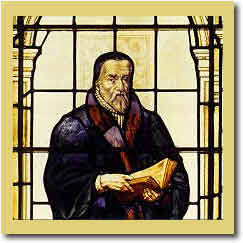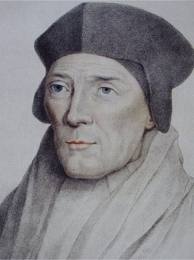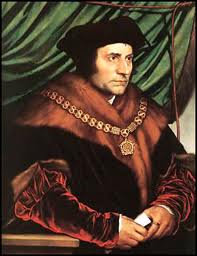Seleccionar idioma español/Choisissez la langue français

William Tyndale
William Tyndale was born about 1495 at Slymbridge near the Welsh border. He received his degrees from Magdalen College, Oxford, and also studied at Cambridge. He was ordained to the priesthood in 1521, and soon began to speak of his desire, which eventually became his life's obsession, to translate the Scriptures into English. It is reported that, in the course of a dispute with a promminent clergyman who disparaged this proposal, he said, "If God spare my life, ere many years I will cause a boy that driveth the plow to know more of the Scriptures than thou dost." The remainder of his life was devoted to keeping that vow, or boast. Finding that the King, Henry VIII, was firmly set against any English version of the Scriptures, he fled to Germany (visiting Martin Luther in 1525), and there travelled from city to city, in exile, poverty, persecution, and constant danger. Tyndale understood the commonly received doctrine—the popular theology—of his time to imply that men earn their salvation by good behavior and by penance. He wrote eloquently in favor of the view that salvation is a gift of God, freely bestowed, and not a response to any good act on the part of the receiver. His views are expressed in numerous pamphlets, and in the introductions to and commentaries on various books of the Bible that accompanied his translations. He completed his translation of the New Testament in 1525, and it was printed at Worms and smuggled into England. Of 18,000 copies, only two survive. In 1534, he produced a revised version, and began work on the Old Testament. In the next two years he completed and published the Pentateuch and Jonah, and translated the books from Joshua through Second Chronicles, but then he was captured (betrayed by one he had befriended), tried for heresy, and put to death. He was burned at the stake, but, as was often done, the officer strangled him before lighting the fire. His last words were, "Lord, open the King of England's eyes." Miles Coverdale continued Tyndale's work by translating those portions of the Bible (including the Apocrypha) which Tyndale had not lived to translate himself, and publishing the complete work. In 1537, the "Matthew Bible" (essentially the Tyndale-Coverdale Bible under another man's name to spare the government embarrassment) was published in England with the Royal Permission. Six copies were set up for public reading in Old St. Paul's Church, and throughout the daylight hours the church was crowded with those who had come to hear it. One man would stand at the lectern and read until his voice gave out, and then he would stand down and another would take his place. All English translations of the Bible from that time to the present century are essentially revisions of the Tyndale-Coverdale work. The best summary I know of Tyndale's writings on grace is found in C.S.Lewis's English Literature in the Sixteenth Century, Excluding Drama (Oxford University Press, 1954), pp 187-191. I will go out on a limb and say that any Christian who reads English and is interested in the theological questions of the Reformation ought to read large portions of this work. In particular, I recommend pages 32-44, 157-221 (or at least 157-165 and 177-192), and 438-463.
[editor: Tyndale Bible download]
John Fisher

John Fisher was born in 1469, enrolled at Cambridge University in 1483, ordained in 1491, and in 1502 became chaplain to Lady Margaret Beaufort, mother of King Henry VII. With her money and his ideas, they greatly altered Cambridge, restoring the teaching of Greek and Hebrew, bringing Erasmus over as a lecturer, and endowing many chairs and scholarships. In 1504 Fisher was made Chancellor of Cambridge and Bishop of Rochester. In 1527 he became chaplain to the new king, Henry VIII, and confessor to the queen, Catherine of Aragon. He stood high in the favor of Henry, who proclaimed that no other realm had any bishop as learned and devout.
Thomas More

Thomas More was born in London, 6 February 1478, the son of a judge. He was sent to Oxford for two years, then studied law and was called to the Bar in 1501. He spent four years at the London Charterhouse (monastery of the Carthusian monks), hoping to become a priest or monk or friar. Leaving the Charterhouse, he entered Parliament. In 1505 he married Jane Colt, who eventually bore him three daughters and a son, but died in 1511. A few weeks after her death, More married a widow, Alice Middleton, with a son and a daughter of her own. The second marriage produced no offspring, but Alice made a good home for the six children already there, plus others whom More took in as students or as foster children. He was noted for giving his daughters far more education than most women, even in the upper classes, received. His friends included Desiderius Erasmus and John Colet, and other scholars who desired moderate reforms in the Church but were set against any break with the Papacy. Henry VIII, who became king in 1509, recognized More's learning and integrity, enjoyed his intelligent and cheerful conversation and ready wit, became his friend, and appointed him to numerous public offices, including finally that of Lord Chancellor of England.
Henry wrote a book On The Seven Sacraments, a defense of traditional doctrines against the teachings of Martin Luther. (The Pope rewarded him with the title, "Defender of the Faith," a title born to this day by English monarchs.) More, discussing the book with Henry while it was still in rough draft, said, "I am troubled, because the book seems to me to give too much honor to the Pope." Henry replied, "There is no such thing as giving too much honor to the Pope."
More himself was pressed into service by the Bishop of London to write pamphlets arguing against the writings of Luther and Tyndale. More undertook to show that Tyndale's translation of the Scriptures is so full of errors that it deserves to be suppressed. Tyndale replied, defending the verses that More had specified, and so on. More and Tyndale exchanged several broadsides, and it can reasonably be maintained that the attacks on both sides were directed against positions that the other side did not really hold, that neither really understood completely the position that the other was defending. (On the other hand, Tyndale's denunciations of what he took to be the doctrines taught by Rome would have fallen on deaf ears if they had not in fact described doctrines that many men believed they had heard from the pulpit, and had found utterly unacceptable. And, mutatis mutandis, the converse holds.)
Thus, for many years, More and Fisher prospered and enjoyed the King's favor. Then the political winds changed. Henry (for reasons that I have discussed at length elsewhere) declared that his marriage to Queen Catharine was null and void. He was opposed in this, by More and Fisher, by Tyndale, and (less promptly and vigorously) by the Pope. Henry broke off relations with the Pope, and proceeded to set Catharine aside and take another wife, Anne Boleyn. Fisher, as a Bishop and as a member of the House of Lords, was called on to ratify this decision, and dramatically refused. More, who by this time was Lord Chancellor of England, resigned his position and retired to private life, hoping that he would be allowed to remain silent, neither supporting the king nor opposing him. But the king required him to take a loyalty oath which recognized the King as the earthly head of the Church in England. This Thomas could not do. He did not believe that the authority of the Pope was a matter of Divine decree— he thought that it was a matter of usage and custom, and expedient for the unity and peace of the Church. He believed that there were many practices in the Church of his day that needed to be reformed, but he did not trust Tyndale, or Luther, or above all Henry, to steer reform in the right direction. So he refused the oath, and was thrown into the Tower of London. While in prison, he wrote A Dialogue of Comfort Against Tribulation, a work still in print, and well worth reading. It is deeply moving to see the contrast between the generally gloomy atmosphere of some of the devotional works that More wrote when he had health, riches, honors, high office, the comfort of a devoted family... and the serene cheerfulness of the Dialogue of Comfort, written when he had none of these, and had every reason to expect that he would eventually be executed for treason. (The penalty for treason was to be hanged, drawn, and quartered. This meant that the convicted traitor was hanged by the neck (not dropped through a trapdoor as in a modern hanging, which is supposed to kill instantly, but slowly lifted off his feet) until he lost consciousness, then taken down and revived, then castrated, then disemboweled and his intestines burned in a fire, then finally put out of his misery by beheading, after which his head was placed on a pike on London Bridge and his body was cut into four quarters to be sent to four parts of the kingdom and displayed there as a warning against treason. This penalty, though not always enforced, was on the English law books from 1305 until at least 1805. I seem to recall that it was carried out once and only once in what is now the United States.) Writing with this fate hanging over him, More faces the prospect straightforwardly. He does not deny that he is terrified, but he maintains that God gives strength to those who ask for it and need it, and that, where the sufferings of martyrdom are concerned, any Christian will be glad tomorrow to have suffered so today.
We are fortunate to have a biography of More by his son-in-law, John Roper. A modern play about him by Robert Bolt, A Man For All Seasons, has been successful on stage and has been filmed at least twice. (The first film, made in 1966, starring Paul Scofield and an all-star cast, received six Oscars. The second, made for TV in 1988, starring Charlton Heston and another all-star cast, was also well received. Both appear on TV from time to time.)
Thomas More was put to death on 6 July 1536. The Roman calendar commemorates him on 22 June together with John Fisher, Bishop of Rochester, who was beheaded on that date a fortnight before More, also for refusing to take the king's oath. Both of them, though convicted of treason, were simply beheaded (a relatively clean and quick death). In Anglican circles, More is often remembered on 6 October together with William Tyndale. Although they disputed bitterly in print, they were in agreement on far more important matters, and curiously alike in many ways. As C. S. Lewis has pointed out, both expected death by torture, and both were mercifully disappointed. Both opposed the anullment of the King's marriage to Catherine of Aragon, both were disdainful of the Middle Ages and eager partisans of the New Learning of the Renaissance, both were vehement opponents of the New Economics, and, most important of all, both of them, while loyal subjects of the King, were prepared to defy him to the death, in the service, as they saw it, of their Lord and Savior Jesus Christ. Incidentally, it would be a mistake to suppose that Henry killed Tyndale in his earlier, Romanist days, and then killed Fisher and More in his later, Protestant days. Tyndale was killed fifteen months after More and Fisher. It would also be a mistake to say (as I have heard it said) that the Church of England killed More. He died, if I may make the distinction, for religious reasons, but was killed by Henry for political reasons, and his death was opposed most strenuously by Archbishop Cranmer.
In discussing their writings, Lewis says (p 192):
What we miss in Tyndale is the many-sidedness, the elbow-room of More's mind; what we miss in More is the joyous, lyric quality of Tyndale. The sentences that stick to the mind from Tyndale's work are half way to poetry--"Who taught the eagles to spy out their prey? even so the children of God spy out their Father." -- "that they might see Love and love again" -- "where the Spirit is, there it is always summer" (though that last, we must confess, is borrowed from Luther). In More we feel all the "smoke and stir" of London; the very plodding of his sentences is like horse traffic in the streets. In Tyndale we breathe mountain air. Amid all More's jokes I feel a melancholy in the background; amid all Tyndale's severitites there is something like laughter, that laughter which he speaks of as coming "from the low bottom of the heart." But they should not be set up as rivals, their wars are over. Any sensible man will want both: they almost represent the two poles between which, here in England, the human mind exists -- complementary as Johnson and Shelley or as Cobbett and Blake.
I close this account with Thomas More's closing words to the court that sentenced him to death.
More I have not to say, my lords, but that like as the blessed Apostle St. Paul, as we read in the Acts of the Apostles, was present and consented to the death of St. Stephen, and kept their clothes that stoned him to death, and yet they be now both twain holy saints in Heaven, and shall continue there friends for ever, so I verily trust, and shall right heartily pray, that though your lordships have now here in earth been Judges to my condemnation, we may yet hereafter in Heaven right merrily all meet together, to our everlasting salvation. And thus I desire Almighty God to preserve and defend the King's Majesty, and to send him good counsel.
written by James Kiefer
Almighty God, who gave your servants Thomas More, John Fisher, and William Tyndale boldness to confess the name of our Saviour Jesus Christ before the rulers of this world, and courage to die for this faith: Grant that we may also be ever ready to give a reason for the hope that is in us, and to suffer gladly for the sake of our Lord Jesus Christ, who lives and reigns with you and the Holy Spirit, one God, now and ever. Amen.